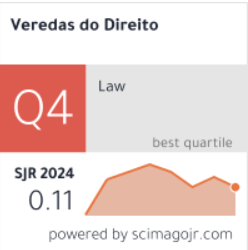LEGAL FRAMEWORK FOR AQUACULTURE IN BRAZIL
ASSIGNMENT OF WATERBODIES AND ENVIRONMENTAL IMPACTS
DOI:
https://doi.org/10.18623/rvd.v20.2417Abstract
The current aquaculture model is given by assigning the use of waterbodies by public administration to the the private sector so that it exploits natural existing resources. It occurs that this economic exploitation generates consequences for the environment. Thus, the present work questions the legal analysis of the attribution of the ownership of use and the regulation necessary to hinder the extrapolation of limits, which may lead to negative ecological impacts, disrupting the natural life in the water course and causing damage to diffuse rights. For this, the dialectical method was used through the observance of Brazilian legal bases that deal with the theme. The methodology used is critical and dialectic. Thus, critical and documental analysis is used to evaluate data and normative criteria related to the practice of aquaculture, according to Brazilian and international data. It was concluded that the assignment of waterbodies should not be understood as a mere territorial assignment, and therefore a regulatory framework for public goods, addressing regulation of impacts, multiple uses and grants based in the national environmental policy (Política Nacional do Meio Ambiente “ PNMA) and National Water Resources Policy (Política Nacional de Recursos Hídricos “ PNRH) is crucial.
Published
How to Cite
Issue
Section
License
I (we) submit this article which is original and unpublished, of my (our) own authorship, to the evaluation of the Veredas do Direito Journal, and agree that the related copyrights will become exclusive property of the Journal, being prohibited any partial or total copy in any other part or other printed or online communication vehicle dissociated from the Veredas do Direito Journal, without the necessary and prior authorization that should be requested in writing to Editor in Chief. I (we) also declare that there is no conflict of interest between the articles theme, the author (s) and enterprises, institutions or individuals.
I (we) recognize that the Veredas do Direito Journal is licensed under a CREATIVE COMMONS LICENSE.
Licença Creative Commons Attribution 3.0








